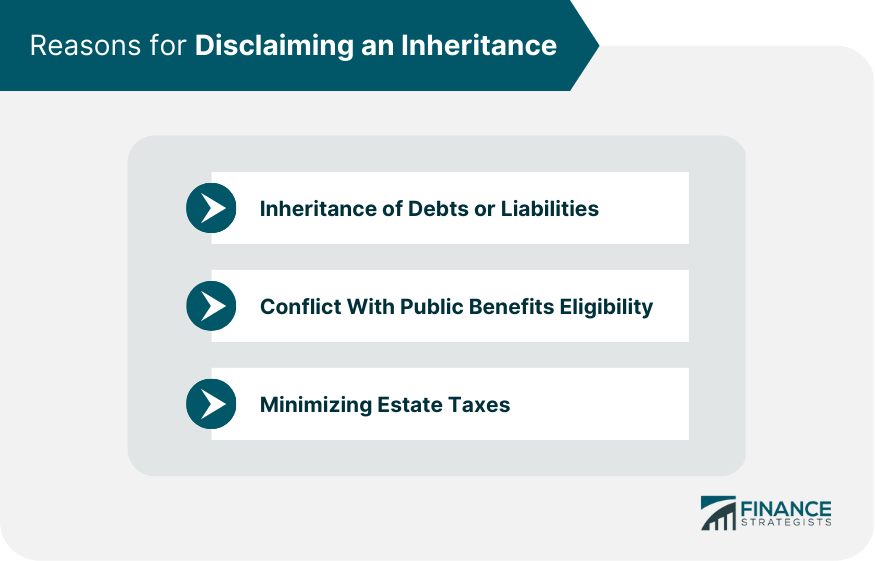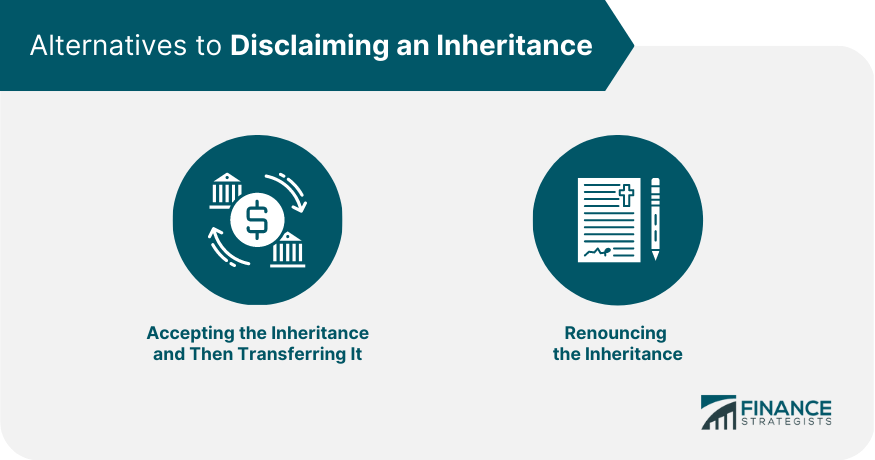Disclaiming an inheritance is the process of legally giving up one's right to receive a bequest or inheritance. It is a refusal to accept the inheritance that has been offered. This is different from renouncing an inheritance, which involves giving up the inheritance after it has already been received. It can be difficult for everyone involved when a loved one passes away. The added stress of receiving an inheritance can sometimes create more complications than benefits. As a result, some beneficiaries may choose to disclaim their inheritance. While it may seem counterintuitive to turn down an inheritance, there are several reasons why someone may choose to do so. There are many reasons why someone may choose to disclaim an inheritance. The following are some common examples: In some cases, an inheritance may include debts or liabilities the beneficiary does not wish to be responsible for. For example, if the deceased had significant credit card debt or outstanding medical bills, these debts may be passed on to the beneficiary. In this scenario, it may make sense for the beneficiary to disclaim the inheritance and avoid taking on these financial obligations. Disclaiming an inheritance may also be necessary for individuals who are receiving public benefits, such as Medicaid or Supplemental Security Income (SSI). If the inheritance would push their income or assets over the limit for these benefits, it may be more beneficial to disclaim the inheritance to continue receiving these public benefits. For beneficiaries who are subject to estate taxes, disclaiming an inheritance may be a way to reduce the tax burden. When a beneficiary disclaims their inheritance, it passes to the next in line, potentially reducing the estate's value and, in turn, the amount of estate tax owed. Disclaiming an inheritance can have legal and financial consequences. It is essential to understand these consequences before making the decision to disclaim an inheritance. When a beneficiary disclaims their inheritance, it passes to the next in line. This is typically the contingent beneficiary named in the will or trust. If there is no contingent beneficiary, the inheritance will go to the next heir as determined by state law. It is important to note that the disclaimed inheritance cannot be passed on to a specific person or entity. Disclaiming an inheritance can also have tax and probate implications. For example, if the disclaimed inheritance would have been subject to estate taxes, the disclaimed amount is subtracted from the estate's value before calculating estate taxes. Additionally, if the estate still needs to be probated, the disclaimed inheritance may be distributed as if the disclaiming beneficiary had predeceased the decedent. This means that the inheritance would pass to the next in line according to the terms of the will or trust. Disclaiming an inheritance can also impact other beneficiaries and heirs. If the disclaimed inheritance had been split among multiple beneficiaries, the remaining beneficiaries would receive a larger share. Additionally, suppose the disclaimed inheritance was a specific asset, such as a piece of property or a valuable collectible. In that case, the asset will pass to the next in line and may be sold to generate cash to distribute among the other beneficiaries. Disclaiming an inheritance requires following specific legal procedures. These procedures may vary depending on the state and the type of inheritance being disclaimed. To be valid, a disclaimer must be: In Writing: The beneficiary must sign a disclaimer in writing. It must also be delivered to the executor or trustee within a specific time frame. Timely: A disclaimer must be made within nine months of the decedent's death. Unconditional: It cannot be conditional. This means the beneficiary cannot stipulate any conditions for disclaiming the inheritance. Not Yet Accepted: A beneficiary cannot disclaim an inheritance that they have already accepted. Timelines for Making a Disclaimer: A disclaimer must be made within nine months of the decedent's death. If the beneficiary is a minor or has a legal disability, they may have an extended timeline to make the disclaimer. The specific procedures for filing a disclaimer may vary depending on the state and the type of inheritance being disclaimed. The following steps may be required: Obtain the Necessary Forms: The executor or trustee can provide the beneficiary with the necessary forms to disclaim the inheritance. Complete the Forms: The beneficiary must complete the forms and sign them in the presence of a notary. Deliver the Forms: The beneficiary must deliver the forms to the executor or trustee within the specified time frame. Disclaiming an inheritance is not the only option for beneficiaries. The following are some alternative options to consider. If a beneficiary is interested in passing on their inheritance to someone else, they can accept the inheritance and then transfer it to the desired recipient. This can be done through a gift or sale. Renouncing an inheritance involves giving it up after it has been received. This differs from disclaiming an inheritance, which involves refusing the inheritance from the outset. Disclaiming an inheritance can be complex and nuanced, with significant legal and financial implications. While it may be appropriate in certain situations, such as if the inheritance includes significant debts or liabilities, it is essential to understand the consequences before deciding. Alternative options may be more suitable for some beneficiaries, such as accepting the inheritance and then transferring it, renouncing the inheritance, or planning for future inheritances through estate planning. Seeking legal and financial advice can help beneficiaries decide what is best for their unique situation. If you are considering disclaiming an inheritance, it is crucial to consult with an estate planning attorney who can help you navigate the legal and financial complexities of the process.What Is Disclaiming an Inheritance?
Reasons for Disclaiming an Inheritance
Inheritance of Debts or Liabilities
Conflict With Public Benefits Eligibility
Minimizing Estate Taxes

Consequences of Disclaiming an Inheritance
What Happens to the Disclaimed Inheritance?
Impact on Taxes and Probate
Effect on Other Beneficiaries and Heirs
How to Disclaim an Inheritance
Requirements for a Valid Disclaimer
Procedures for Filing a Disclaimer
Alternatives to Disclaiming an Inheritance
Accepting the Inheritance and Then Transferring It
Renouncing the Inheritance

Conclusion
Disclaiming an Inheritance FAQs
Disclaiming an inheritance means legally renouncing one's right to receive a bequest or inheritance.
Common reasons for disclaiming an inheritance include inheritance of debts or liabilities, conflict with public benefits eligibility, and minimizing estate taxes.
Disclaiming an inheritance can impact taxes and probate and may affect other beneficiaries and heirs. The disclaimed inheritance passes to the next in line and cannot be passed on to a specific person or entity.
No, a beneficiary cannot disclaim an inheritance that they have already accepted. However, they may be able to renounce the inheritance.
While it is possible to disclaim an inheritance without a financial advisor, seeking legal and financial advice can help beneficiaries understand the implications of their decision and explore alternative options that may be better suited for their unique situation.
True Tamplin is a published author, public speaker, CEO of UpDigital, and founder of Finance Strategists.
True is a Certified Educator in Personal Finance (CEPF®), author of The Handy Financial Ratios Guide, a member of the Society for Advancing Business Editing and Writing, contributes to his financial education site, Finance Strategists, and has spoken to various financial communities such as the CFA Institute, as well as university students like his Alma mater, Biola University, where he received a bachelor of science in business and data analytics.
To learn more about True, visit his personal website or view his author profiles on Amazon, Nasdaq and Forbes.















